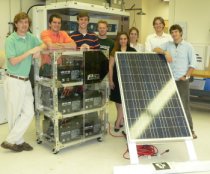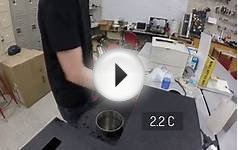 Senior projects focus on the synthesis and application of the basic science, mathematics, engineering and design skills taught in earlier courses. It also provides the students with the opportunity to exercise and apply the more advanced material taught in the senior year. Called ‘Capstone’ courses, these culminating design classes give students a rigorously challenging, real-world, immersive engineering experience.
Senior projects focus on the synthesis and application of the basic science, mathematics, engineering and design skills taught in earlier courses. It also provides the students with the opportunity to exercise and apply the more advanced material taught in the senior year. Called ‘Capstone’ courses, these culminating design classes give students a rigorously challenging, real-world, immersive engineering experience.
Students are guided through the various stages of a professional engineering design project, including the design, fabrication and experimental testing of a complex component or system. Faculty serves as mentors, consultants and evaluators, and workshops on special topics, such as design and manufacturing of composite structures or design and programming of electronic components, are offered.
The Duke mechanical engineering senior design experience is intended to help students prepare for the workplace. During the first semester, in ME 421L(141L) Mechanical Design, students work in teams of 4 to 8 persons to design and implement a project, and use technical writing skills to produce a project plan and design report. During the second semester, in ME 424L(160L) Mechanical Systems Design, students complete their project and deliver a final report, project poster, and oral presentation.
The Duke senior design experience emphasizes the following skills:
- written communication
- oral communication
- engineering ethics
- project planning and scheduling
- decision-making
- team building and team dynamics
- engineering economics
- developing/writing functional specifications
- safety in product design
- leadership
- standards and regulations
- drawings/creativity/concept generation
- analysis tools
- intellectual property/patents
- prototyping and testing
- optimization
- sustainability
- manufacturing processes
- risk assessment
- CAD design and layout
- product liability and quality assurance
The project costs for senior design classes are funded through department, industry sponsors and foundation support, with individual project team budgets ranging from a few hundred dollars to several thousand.
Industry Sponsorship
Often students will work with industrial partners in a collaborative research environment. As they tackle real-world engineering projects, the engineering students and their industry sponsors are afforded unlimited possibilities for learning and achievement.








